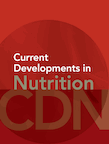Caffeic Acid Phenethyl Ester and Its Fluorinated Derivative as Natural Anti-obesity Agents.
Srujana Rayalam, Devin Mills, Yusra Azhar, Ebony Miller, Xinyu Wang
Current Developments in Nutrition, Volume 3, Issue Supplement_1, June 2019,
Abstract
Objectives
Caffeic acid phenethyl ester (CAPE), an active component of propolis from honeybee hives, is well studied for its beneficial effects on cancer, inflammation and diabetes. There are however limited studies investigating the effects of CAPE on obesity. Currently, several natural products are under investigation for their effects on adipocyte life cycle. A multi-targeted approach for prevention and treatment of obesity includes targeting adipocytes at all the stages of life cycle by decreasing adipocyte differentiation, inducing lipolysis and/or by inducing adipocyte apoptosis. In this study, we examined the effects of CAPE on preadipocyte viability, adipogenesis and lipolysis. Earlier reports on CAPE indicate that CAPE is liable to enzymatic hydrolysis in vivo making this compound unstable for therapeutic applications. In the current study, we compared the anti-adipogenic effects of CAPE with its novel fluorinated derivative (FCAPE), a more stable compound.

* THESE STATEMENTS HAVE NOT BEEN EVALUATED BY THE FOOD AND DRUG ADMINISTRATION. THIS IS NOT INTENDED TO DIAGNOSE, TREAT CURE OR PREVENT ANY DISEASE.